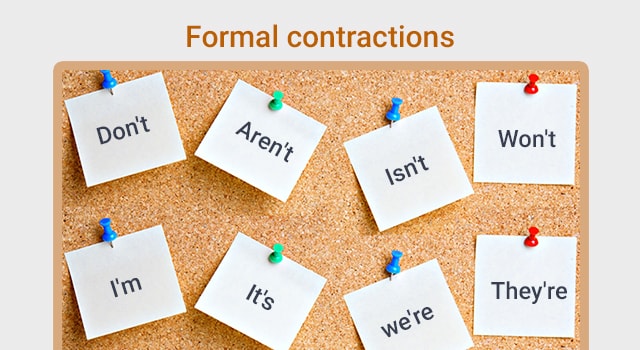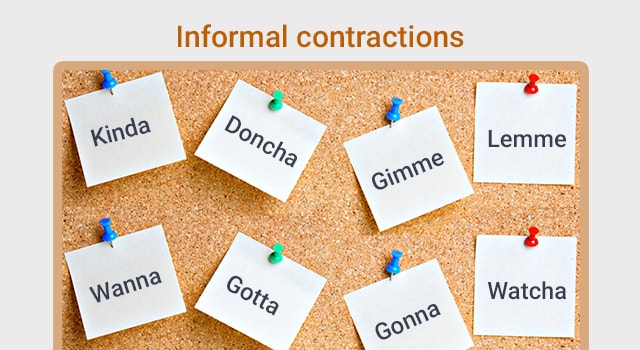♦ A contraction is a shortened version of a word or a group of words. ♦ Contractions are a result of omitting letters or their sounds between two ( or more ) words. जिस तरह "contraction" शब्द का अर्थ है सिकोड़ना या सिकुड़न, उसी तरह जब दो ( या दो से ज़्यादा ) शब्दों को एक साथ इस तरह ( सिकोड़ कर या छोटा कर के ) बोला जाए कि वे सुनने में एक ही लगें तो उसे contraction कहा जाता है। जब आप किसी भाषा को fluency के साथ बोलते हैं तो अक्सर कुछ शब्दों का pronunciation उस तरह नहीं कर पाते जिस तरह से उन्हें लिखा जाता है और इसी तरह से जन्म होता है contractions का। ♦ Benefits of using a contraction:
- Use of fewer letters saves time.( while writing or speaking )
- Makes you sound casual.
- Helps you to avoid 'over-pronouncing' the words.
 हम सभी ने स्कूल में कुछ common contractions के बारे में पढ़ा है जैसे की:
¤ Do + not = Don’t
I don't eat meat = I do not eat meat.
मैं मांस नही खाता।
¤ Are + Not = Aren't
They aren't coming to the party = They are not coming to the party.
वे पार्टी मे नहीं आ रहे हैं।
¤ Is + not = Isn't
This isn't your fault = This is not your fault.
यह आपकी गलती नहीं है।
¤ Will + Not = Won't
I won't tolerate this carelessness = I will not tolerate this carelessness.
मैं इस तरह की लापरवाही बर्दाश्त नहीं करूँगा।
¤ I + Am = I'm
I'm sorry for the delay = I am sorry for the delay.
विलंब के लिए मैं क्षमा चाहता हूँ।
¤ They + Are = They're
They're going to get married = They are going to get married.
वे शादी करने जा रहे हैं।
¤ We + Are = We're
We're doing our best = We are doing our best.
हम अपनी पूरी कोशिश कर रहे हैं।
And the most confused contraction is:
¤ It + is OR It + has = It's
It's raining outside = It is raining outside.
बाहर वर्षा हो रही है।
It's nothing to do with you = It has nothing to do with you.
इसका आपसे कोई लेना - देना नहीं है।
ये तो बात हुई common contractions की जो की grammar के नियमों के अनुसार भी सही मानी जाती हैं। लेकिन, क्योंकि contractions का जन्म ही बोलते समय शब्दों के अधूरे उच्चारण के कारण होता है, इसलिए कई बार इन्हें slangs के रूप में भी इस्तेमाल किया जाता है।
हम सभी ने स्कूल में कुछ common contractions के बारे में पढ़ा है जैसे की:
¤ Do + not = Don’t
I don't eat meat = I do not eat meat.
मैं मांस नही खाता।
¤ Are + Not = Aren't
They aren't coming to the party = They are not coming to the party.
वे पार्टी मे नहीं आ रहे हैं।
¤ Is + not = Isn't
This isn't your fault = This is not your fault.
यह आपकी गलती नहीं है।
¤ Will + Not = Won't
I won't tolerate this carelessness = I will not tolerate this carelessness.
मैं इस तरह की लापरवाही बर्दाश्त नहीं करूँगा।
¤ I + Am = I'm
I'm sorry for the delay = I am sorry for the delay.
विलंब के लिए मैं क्षमा चाहता हूँ।
¤ They + Are = They're
They're going to get married = They are going to get married.
वे शादी करने जा रहे हैं।
¤ We + Are = We're
We're doing our best = We are doing our best.
हम अपनी पूरी कोशिश कर रहे हैं।
And the most confused contraction is:
¤ It + is OR It + has = It's
It's raining outside = It is raining outside.
बाहर वर्षा हो रही है।
It's nothing to do with you = It has nothing to do with you.
इसका आपसे कोई लेना - देना नहीं है।
ये तो बात हुई common contractions की जो की grammar के नियमों के अनुसार भी सही मानी जाती हैं। लेकिन, क्योंकि contractions का जन्म ही बोलते समय शब्दों के अधूरे उच्चारण के कारण होता है, इसलिए कई बार इन्हें slangs के रूप में भी इस्तेमाल किया जाता है।
 तो अब नज़र डालते हैं कुछ informal contractions पर जिन्हें उनकी casual pronunciation के आधार पर ही लिखा या spell किया जाता है:
∗ Note that, unlike normal contractions, we do not always use apostrophes (') with informal contractions when written.
¤ Kind + of = kinda
My maths teacher is kinda ( = kind of ) strict.
मेरे गणित के शिक्षक थोड़े सख्त है।
¤ Don't + you = Doncha
Doncha ( = Don't you ) worry about me, I am fine.
आप मेरे बारे में चिंता मत करो, मैं ठीक हूँ।
¤ Give + me = Gimme
Gimme ( = Give me ) some time to finish my work.
मुझे अपना काम खत्म करने के लिए कुछ समय दें।
¤ Let + me = Lemme
Lemme ( = Let me ) see what I can do.
मुझे देखने दो मैं क्या कर सकता हूँ।
¤ Want + a OR Want + to = Wanna
Do you wanna ( = want a ) drink?
आपको ड्रिंक चाहिए?
Do you wanna ( = want to ) come with us?
क्या आप हमारे साथ आना चाहते हैं?
¤ Got + a OR Got + to = Gotta
Have you gotta ( = got a ) car?
क्या तुम्हारे पास कार है?
I gotta ( = got to ) go.
मुझे जाना होगा।
¤ Going + to = gonna
They are gonna ( = going to ) get married.
वे शादी करने जा रहे हैं।
¤ What + are you OR What + have you = Watcha
Watcha ( = What are you ) up to these days?
इन दिनों आप क्या कर रहे हैं?
Whatcha ( = What have you ) got in your bag?
आपके बैग में क्या है?
For all I know, these informal contractions help you to better understand the native accent or just add some swag to your words. Doncha think so??
Formal contractions का प्रयोग बोलने और लिखने, दोनों में किया जा सकता है परन्तु informal contractions का इस्तेमाल सिर्फ बातचीत के समय किया जाए तो उचित है। लिखते समय इनका प्रयोग न करना ही ठीक है।
It's OK to use contractions in speech as it comes naturally to you, but you should try to avoid them in writing. In a formal writing such as a school report, an official E-mail, or in any such situations, you might wanna steer clear of the use of contractions.
तो अब नज़र डालते हैं कुछ informal contractions पर जिन्हें उनकी casual pronunciation के आधार पर ही लिखा या spell किया जाता है:
∗ Note that, unlike normal contractions, we do not always use apostrophes (') with informal contractions when written.
¤ Kind + of = kinda
My maths teacher is kinda ( = kind of ) strict.
मेरे गणित के शिक्षक थोड़े सख्त है।
¤ Don't + you = Doncha
Doncha ( = Don't you ) worry about me, I am fine.
आप मेरे बारे में चिंता मत करो, मैं ठीक हूँ।
¤ Give + me = Gimme
Gimme ( = Give me ) some time to finish my work.
मुझे अपना काम खत्म करने के लिए कुछ समय दें।
¤ Let + me = Lemme
Lemme ( = Let me ) see what I can do.
मुझे देखने दो मैं क्या कर सकता हूँ।
¤ Want + a OR Want + to = Wanna
Do you wanna ( = want a ) drink?
आपको ड्रिंक चाहिए?
Do you wanna ( = want to ) come with us?
क्या आप हमारे साथ आना चाहते हैं?
¤ Got + a OR Got + to = Gotta
Have you gotta ( = got a ) car?
क्या तुम्हारे पास कार है?
I gotta ( = got to ) go.
मुझे जाना होगा।
¤ Going + to = gonna
They are gonna ( = going to ) get married.
वे शादी करने जा रहे हैं।
¤ What + are you OR What + have you = Watcha
Watcha ( = What are you ) up to these days?
इन दिनों आप क्या कर रहे हैं?
Whatcha ( = What have you ) got in your bag?
आपके बैग में क्या है?
For all I know, these informal contractions help you to better understand the native accent or just add some swag to your words. Doncha think so??
Formal contractions का प्रयोग बोलने और लिखने, दोनों में किया जा सकता है परन्तु informal contractions का इस्तेमाल सिर्फ बातचीत के समय किया जाए तो उचित है। लिखते समय इनका प्रयोग न करना ही ठीक है।
It's OK to use contractions in speech as it comes naturally to you, but you should try to avoid them in writing. In a formal writing such as a school report, an official E-mail, or in any such situations, you might wanna steer clear of the use of contractions.
To learn more, download our ‘English to Hindi’ dictionary app HinKhoj.



